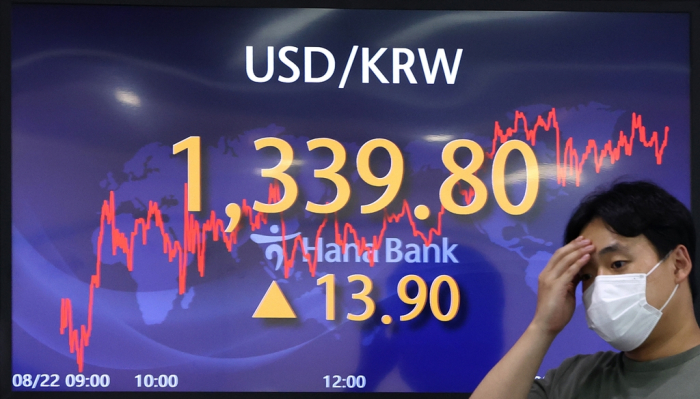Foreign exchange
Korea’s mounting trade deficit knocks won to 13-year low
The won may weaken to the 1,400/dollar level on Fed’s looming 75-bp rate hike, China’s slowing economy, Europe’s inflation crisis
By Aug 22, 2022 (Gmt+09:00)
4
Min read
Most Read
LG Chem to sell water filter business to Glenwood PE for $692 million


KT&G eyes overseas M&A after rejecting activist fund's offer


Kyobo Life poised to buy Japan’s SBI Group-owned savings bank


StockX in merger talks with Naver’s online reseller Kream


Meritz backs half of ex-manager’s $210 mn hedge fund



South Korea’s won has hit the weakest level since the 2008-09 global financial crisis on a mounting trade deficit while growing concerns over the country’s top overseas market China are expected to further weigh on the local currency and inflation in Asia’s fourth-largest economy.
The won on Monday declined up to 1.1% to 1,340.2 against the dollar during the local currency market, the softest since April 29, 2009. The South Korean unit was the worst performer among emerging Asian currencies with an 11.3% loss versus the greenback.
South Korea logged a trade deficit of $10.2 billion in the first 20 days of August, more than double a revised shortfall of $4.8 billion in all of July, according to the customs data. That ramped up the deficit so far this year to $25.5 billion, swinging from a surplus of $15.6 billion a year earlier.
Imports surged 22.1% to $43.6 billion in the Aug. 1-20 period on the sustained global supply chain disruption and higher commodity prices, while exports rose 3.9% with shipments of key products such as semiconductors down.
If the trade balance remains in the red this month, the country will report a shortfall for five months in a row, the longest deficit spree since the December 2007 and April 2008 period, just before the 2008-09 financial crisis hurt the world’s economy.
The weak economic fundamentals, along with increasing bearish factors from overseas markets, are predicted to hurt the won further, analysts said.
“South Korea’s exports may deteriorate further as the global economy is contracting,” said Moon Hong-cheol, an economist at DB Financial Investment. “The won could weaken to the 1,400 level, given external risks including China’s economic troubles stemming from a property market crisis.”
EXTERNAL RISKS
China’s central bank earlier in the day eased monetary policy further by slashing its benchmark lending rate and cutting the mortgage reference to bolster the world’s second-largest economy hurt by a real estate market crisis and a resurgence in COVID-19 cases.
The Chinese yuan depreciated after the move, putting further pressure on the won.
“The rate cuts were seen as a move to prevent a hard landing of the economy rather than a measure to boost the economy,” Moon said. “Growing worries about the Chinese economy resulted in the won’s further weakness as South Korea highly relies on China.”
Inflation shocks in the UK and Germany accelerated the dollar’s strength.
UK consumer prices surged 10.1% in July annually, marking another 40-year high, while German producer prices last month soared 37.2% from a year earlier.
“The euro came under further pressure from the German inflation shocks along with the drought and the sustained rise in natural gas prices,” said Park Sang-hyun, an economist at HI Investment & Securities. “A weaker euro became a key driver of the dollar’s strength.”
The dollar index, the US currency’s value against six major units including the euro, hit its highest point since October 2002.
That came as the US Federal Reserve’s policymakers made hawkish comments last week.
FED VS. BOK
St. Louis Fed President James Bullard said that he is currently leaning toward supporting a third straight 75-basis-point interest rate hike in September, given the strength of the economy.
Richmond Fed President Thomas Barkin said that the central bank will do what it takes to return inflation to its target, even if that means risking a recession.
San Francisco Fed President Mary Daly said hiking rates by 50 or 75 basis points at the US central bank's next policy meeting on Sept. 20-21 would be a "reasonable" way to get short-term borrowing costs to "a little bit above" 3% by the end of this year, and on their way to a bit higher in 2023.
Given such hawkish stances, the won is unlikely to rebound, unless Fed Chair Jerome Powell signals a monetary policy shift at the annual global central bankers' conference in Jackson Hole, Wyoming, analysts said.
The Fed already decided to double the pace of quantitative tightening to $90 billion from the current $47.5 billion starting Sept. 1.
The won’s weakness is unlikely to support South Korea’s exports but to add inflationary pressure, ramping up import prices, complicating the Bank of Korea’s interest rate policy decision, experts said.

BOK Governor Rhee Chang-yong has said that the central bank plans to raise interest rates by the usual 25 basis points to bring rampant inflation under control, although he did not rule out another 50-basis-point hike.
The central bank last month took the most aggressive measure with a 50-basis-point policy interest rate hike for the first time in its history.
Write to Mi-Hyun Jo and Jin-gyu Kang at mwise@hankyung.com
Jongwoo Cheon edited this article.
More to Read
-
 EconomyKorea trade deficit jumps as chip exports fall on Aug. 1-10
EconomyKorea trade deficit jumps as chip exports fall on Aug. 1-10Aug 12, 2022 (Gmt+09:00)
2 Min read -
 EconomyKorea inflation hits highest point since 1998 crisis, BOK to hike rates
EconomyKorea inflation hits highest point since 1998 crisis, BOK to hike ratesAug 02, 2022 (Gmt+09:00)
3 Min read -
 Central bankBOK delivers first-ever 50-bp hike to curb inflation
Central bankBOK delivers first-ever 50-bp hike to curb inflationJul 13, 2022 (Gmt+09:00)
3 Min read
Comment 0
LOG IN


